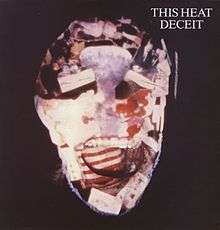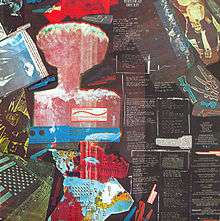Deceit (album)
| Deceit | ||||
|---|---|---|---|---|
 | ||||
| Studio album by This Heat | ||||
| Released | September 1981 | |||
| Recorded | 1981 | |||
| Studio |
| |||
| Genre | ||||
| Length | 40:45 | |||
| Language | English | |||
| Label | Rough Trade | |||
| Producer | This Heat and David Cunningham | |||
| This Heat chronology | ||||
| ||||
| Additional cover art | ||||
 The cover art (as shown in the 1991 CD booklet) reflected This Heat's anxiety about nuclear war. |
||||
Deceit is the second and final studio album by English experimental rock band This Heat. It was recorded in 1981 and released in September of the same year by Rough Trade Records. The title is in part a pun on the band's name.
Deceit is regarded as a classic of the post-punk era, and was ranked at number 20 on Pitchfork's list of the greatest albums of the 1980s.[1]
Background
In a 1991 interview, Charles Hayward explained that the threat of nuclear warfare motivated the band and provided the album with an underlying theme: "The whole speak, 'Little Boy', 'Big Boy' [sic], calling missiles cute little names. The whole period was mad! We had a firm belief that we were going to die and the record was made on those terms.… The whole thing was designed to express this sort of fear, angst, which the group was all about, really."[2] The album's subject matter also deals with war and imperialism.[3] The cover art reflects these concerns, and includes a photomontage of images such as mushroom clouds, thematic maps depicting nuclear arsenals and photographs of Ronald Reagan, Leonid Brezhnev and Nikita Khrushchev.
As with other This Heat recordings, much of the album was recorded at Cold Storage, a disused refrigerated storeroom at a former meat pie factory in Acre Lane, Brixton, England.[4] The music included new improvisations along with songs the band had been playing during live performances (portions of these songs were culled from actual concert recordings).[2][4] As Hayward describes, "some of the album was really plush sounding, some dim and pokey. Sometimes it would sound like the machinery was breaking up. We deliberately would make it sound as though the record player was exploding."[2][lower-alpha 1]
Release
During the 1990s, intermittent availability made Deceit a rarity and a collector's item among fans. In 2006, This Is, a Recommended Records imprint, released a remastered version of Deceit as part of the 6-CD Out of Cold Storage box set. This Is also released the album as a separately available CD. In January 2016, Light in the Attic imprint Modern Classics Recordings pressed remastered reissues of Deceit, This Heat, and Health and Efficiency on vinyl.[5]
Critical reception
| Professional ratings | |
|---|---|
| Review scores | |
| Source | Rating |
| AllMusic | |
| Pitchfork | 9.0/10 (2001)[7] |
| Pitchfork | 9.1/10 (2016)[5] |
| Tiny Mix Tapes | very favourable[8] |
Deceit has been well-received by critics.
AllMusic wrote of the album: "Out of all the boundary breaking that occurred during the fertile era of post-punk, This Heat's Deceit is one of the most expansive, imaginative and remarkably wild records to have been produced during the time—and very possibly the last three decades."[6] The Trouser Press Record Guide described the album as "austere, brilliant and indescribable."[9] Tiny Mix Tapes called it a "radiation-soaked masterpiece".[8]
Track listing
All tracks written by This Heat (Charles Hayward, Gareth Williams, Charles Bullen).
| No. | Title | Length |
|---|---|---|
| 1. | "Sleep" | 2:13 |
| 2. | "Paper Hats" | 5:57 |
| 3. | "Triumph" | 2:55 |
| 4. | "S. P. Q. R." | 3:26 |
| 5. | "Cenotaph" | 4:35 |
| 6. | "Shrink Wrap" | 1:40 |
| 7. | "Radio Prague" | 2:21 |
| 8. | "Makeshift Swahili" | 4:04 |
| 9. | "Independence" | 3:39 |
| 10. | "A New Kind of Water" | 4:57 |
| 11. | "Hi Baku Shyo 被爆症 (Suffer Bomb Disease)" | 4:03 |
Personnel
- This Heat
- Charles Hayward – vocals, bass guitar, keyboards, drums, tape music
- Gareth Williams – vocals, bass guitar, keyboards, tape music
- Charles Bullen – vocals, clarinet, guitar, drums, tape music
- Production
- David Cunningham – production
- Martin Frederick – mixing
- Laurie-Rae Chamberlain – colour xerography
- Nicholas Goodall – sleeve photography direction
- Studio 54 – sleeve design
Charts
| Chart (1981) | Peak position |
|---|---|
| UK Indie Chart | 18[10] |
Notes
- ↑ The source text actually reads "record played", but this is assumed to be a typographical error.
References
- ↑ "Staff Lists: Top 100 Albums of the 1980s". Pitchfork. 20 November 2002. Retrieved 7 January 2013.
- 1 2 3 Plunkett, Daniel (June 1992). "Charles Hayward". N D. 16: 7–14.
- ↑ Tudor, Alexander (7 November 2008). "Classic Political Records: This Heat Deceit / In Depth // Drowned in Sound". Drowned in Sound. Retrieved 7 January 2013.
- 1 2 Cutler, Chris (2006). Out of Cold Storage (CD booklet). Recommended Records.
- 1 2 Sherburne, Phillip (26 January 2016). "This Heat: This Heat/Health and Efficiency/Deceit - Album Reviews". Retrieved 26 January 2016.
- 1 2 Kellman, Andy. "Deceit – This Heat : Songs, Reviews, Credits, Awards : AllMusic". AllMusic. Retrieved 7 January 2013.
- ↑ Leone, Dominique (18 February 2002). "This Heat: Deceit | Album Reviews | Pitchfork". Pitchfork. Retrieved 7 January 2013.
- 1 2 Bowe, Miles (27 April 2012). "This Heat – Deceit | DeLorean | Tiny Mix Tapes". Tiny Mix Tapes. Retrieved 23 January 2013.
- ↑ Grant, Steven (1991). Robbins, Ira, ed. The Trouser Press Record Guide (Fourth ed.). New York: Collier Books. p. 673. ISBN 0-02-036361-3. Retrieved 7 January 2013.
- ↑ Lazell, Barry (1997). Indie Hits 1980-1989. Cherry Red Books. Retrieved 5 September 2014.
External links
- Deceit at Discogs (list of releases)
- The Quietus article on Deceit